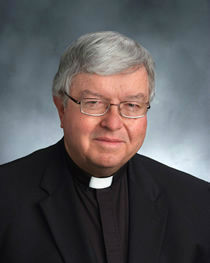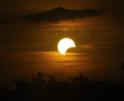
Faith
This question is an easy one.

Doyle
Q. About two years ago, I made a promise to the Blessed Virgin Mary that I would fast on the Wednesdays and Fridays of each week, taking only bread and water -- for the poor souls in purgatory and for peace in the world. I have remained faithful to this commitment since then and intend to continue for the rest of my life.
Recently, my wife celebrated her 50th birthday, and the same day also happened to be our 20th wedding anniversary. Unfortunately, it fell on a Wednesday, so I refused to take anything but bread and water. My wife was not very happy with that and has remained upset about it since that day.
We are both practicing Catholics, although I believe that I pray much more than she does and attend Mass every morning, while she goes on Sundays and holy days. We have had a good marriage over the years, enjoying many happy moments together, and God has blessed us with four beautiful kids. I have always thought it important to put God before family, and I find it hard to break a promise made to the mother of God.
Please advise me as to how I can explain this to my wife, so that I am free to worship as I want and so that my personal sacrifices do not infringe on our daily lives. Should I have taken a break on that one special day and had a meal with her, or did I do the right thing by sticking with my fast? (New York City)
A. This question is an easy one. OF COURSE, you should have had a meal with your wife on her birthday and your wedding anniversary!
Read the Gospel of Mark (2:23-28), where the disciples of Jesus picked grain because they were hungry -- even though it was the Sabbath. Jesus defended them against the complaining Pharisees, saying "The Sabbath was made for man, not man for the Sabbath."
I am impressed and edified by the penitential practice you have chosen, but I feel quite confident that the mother of God would have approved your "taking a break" on that very special day. I think that you should apologize to your wife and take her out for a very nice dinner.
Q. Recently, I was traveling on business in Toronto. Because that day happened to be the solemnity of the Assumption, I went in search of a church to attend Mass. I learned, though, that the Assumption is not a holy day of obligation in Canada, and no additional Masses were being offered beyond the normal weekday schedule.
I was determined to attend Mass anyway, and managed to do so, but it made me wonder: Do the obligations as determined in your home country hold when you are traveling and find yourself in a place with different norms? Or was the obligation lifted because it did not apply in the place where I happened to be that day? (northern Virginia)
A. You have no doubt heard the saying, "When in Rome, do as the Romans do." But in the case which you pose, following that maxim would be wrong! When traveling for brief periods, as you were, Catholics should follow the rules of their own country on Mass attendance.
Here is the technical explanation: The church's Code of Canon Law says that a particular nation's regulations govern those who have a domicile or quasi-domicile in that country and are actually residing there (Canon 12.3). Canon 102.2 defines a "quasi-domicile" as a place where one intends to reside for at least three months.
Since you clearly had no intention of staying in Canada for three months, you were obliged to observe the holy days as designated by the bishops of your home country, the United States; so your decision to attend Mass on the feast of the Assumption was the correct one even though you happened to be in Canada on that day.
And that rule actually makes things easier for us. Canon 1246 lists 10 holy days of obligation but allows national conferences of bishops to reduce the number or to transfer their observance to a Sunday, and there is considerable variation from country to country.
Vatican City observes all 10, the United States has six, while Canada keeps only two (Christmas and Jan. 1). Imagine the confusion if U.S. Catholics, when planning to travel for a few days in a foreign nation, were obliged in advance to learn that particular country's holy days.
- - -
Questions may be sent to Father Kenneth Doyle at askfatherdoyle@gmail.com and 30 Columbia Circle Dr., Albany, New York 12203.
- Father Kenneth Doyle is a columnist for Catholic News Service
Recent articles in the Faith & Family section
-
Scripture Reflection for April 21, 2024, Fourth Sunday of EasterJem Sullivan
-
The new Temple: How Easter changes religionDr. R. Jared Staudt
-
The wonder of Ordinary TimeLucia A. Silecchia
-
Is there still responsibility for past sins after confession?Jenna Marie Cooper
-
Wounds, not scarsJaymie Stuart Wolfe


















